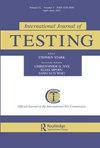The Relationship between Response-Time Effort and Accuracy in PISA Science Multiple Choice Items
IF 1.4
Q2 SOCIAL SCIENCES, INTERDISCIPLINARY
引用次数: 12
Abstract
The study examined the relationship between examinees’ test-taking effort and their accuracy rate on items from the PISA 2015 assessment. The 10% normative threshold method was applied on Science multiple-choice items in the Cyprus sample to detect rapid guessing behavior. Results showed that the extent of rapid guessing across simple and complex multiple-choice items was on average less than 6% per item. Rapid guessers were identified, and for most items their accuracy was lower than the accuracy for students engaging in solution-based behavior. Examinees with higher overall performance on the test items tended to engage in less rapid guessing than their lower performing peers. Overall, this empirical investigation presents original evidence on test-taking effort as measured by response time in PISA items and tests propositions of Wise’s (2017) Test-Taking Theory.PISA科学选择题反应时间努力与准确性的关系
该研究考察了考生的考试努力与2015年PISA评估项目的准确率之间的关系。将10%标准阈值法应用于塞浦路斯样本中的科学多项选择题,以检测快速猜测行为。结果显示,在简单和复杂的多项选择题中,每个项目的快速猜测程度平均不到6%。快速猜测者被识别出来,对于大多数项目,他们的准确性低于参与基于解决方案的行为的学生的准确性。在测试项目上总体表现较高的考生往往比表现较差的同龄人猜得不那么快。总的来说,这项实证调查提供了通过PISA项目中的反应时间来衡量考试努力的原始证据,并测试了Wise(2017)考试理论的命题。
本文章由计算机程序翻译,如有差异,请以英文原文为准。
求助全文
约1分钟内获得全文
求助全文
来源期刊

International Journal of Testing
SOCIAL SCIENCES, INTERDISCIPLINARY-
CiteScore
3.60
自引率
11.80%
发文量
13
 求助内容:
求助内容: 应助结果提醒方式:
应助结果提醒方式:


